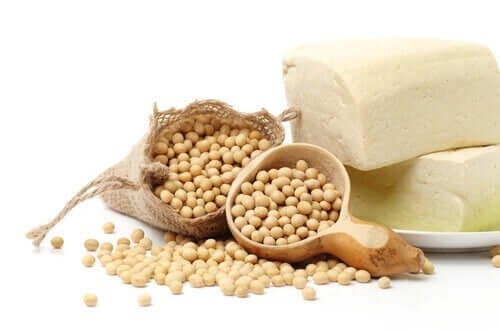Soy Protein: Is it Good or Bad for Your Health?

You can eat soy protein in different ways, whether in the form of soybeans or a variety of soy-based products, like tofu or soy milk. However, there’s some controversy surrounding the health benefits of soy protein.
Vegans and vegetarians get their protein through soy. However, is soy protein actually good for your health?
In this article, we’ll review some scientific research on the topic.
The nutritional properties of soy

Soy provides protein with high nutritional quality. In fact, it contains the nine amino acids that are essential for your body. That’s just what makes it a fundamental food for vegans and vegetarians.
Cooked soybeans provide 127 Calories per 100 grams and about 12 grams of protein, 5.5 grams of fat, 10 grams of carbohydrates, and 4 of fiber for the same quantity.
Bearing this in mind, the best way to take advantage of its benefits is to eat whole soybeans or products that are made with them, like tempeh, miso, or tofu. These products don’t have preservatives, sugar, or added fat.
Discover: Tofu Dishes: Two Recipes to Try at Home
Soy protein powder
If you’re looking specifically at soy protein powder, which is made with defatted soybeans to eliminate their fiber and sugars, you’ll find that their nutritional properties per 28 grams are:
- 95 calories
- 1 gram of fat
- 2 grams of carbohydrates
- 1.6 grams of fiber
- 23 grams of protein
- 25% of your recommended daily value of iron
- 22% of your recommended daily value of phosphorous
- 21% of your recommended daily value of magnesium
Soy powder is a good source of protein. However, it also contains phytates, a component that can reduce your absorption of minerals.
The surrounding soy protein

The critics of soy protein look at its components: isoflavones and phytoestrogens. In the past, they were associated with the growth of cancer cells and fertility and thyroid problems.
However, science has provided better answers.
Soy and cancer
In 2010, a study concluded that women who had consumed a moderate amount of soy throughout their lives had a lower risk of suffering breast cancer than those that didn’t eat it.
It’s also worth highlighting that the same study didn’t find a relation between a higher risk of breast cancer and the moderate consumption of isoflavones.
You might be interested in: Breast Cancer: The Different Types, Symptoms and Treatment
The relation between soy and fertility
Soy protein is full of phytoestrogens, a compound similar to estrogens, but made in plants, that have been associated with hormone levels.
Research hasn’t found any results that support the reduction of testosterone due to soy consumption. On the contrary, they haven’t seen any changes in men who consume soy.
Thyroid problems and soy
The latest worry about regular soy consumption is that it could cause an increase in thyroid problems.
While the majority of studies haven’t found any direct relationship between the two, a 2011 study found an increase in the progression of subclinical hypothyroidism, a type of hypothyroidism shown in people who eat soy regularly. Despite this, there aren’t enough studies to make a firm conclusion.
If you suffer from hypothyroidism, ask your doctor before deciding to increase your soy intake. You might need to change your thyroid medicine based on the change of diet.
Genetically modified foods
Finally, there is controversy around the fact that soy products are frequently genetically modified. However, to this date, there is no scientific evidence that there are adverse health effects when you compare genetically modified soy to non-modified soy.
The benefits of soy protein

Including soy protein in your diet can carry many health benefits. For example:
- A reduction in bad cholesterol (LDL) and an increase in good cholesterol (HDL).
- Some studies associate regular consumption with a decreased risk of breast cancer.
- Regular consumption can reduce the risk of prostate cancer.
- Soy is an excellent source of vegetable protein, which is perfect for people who don’t eat animal proteins, either due to health problems or personal conviction.
- It could help reduce symptoms of menopause. However, at the moment, the data is not conclusive on this point.
Soy protein provides benefits to your body and its side effects, at the moment, haven’t been proven. If you want to increase your soy consumption, talk to your doctor or nutritionist. They will be able to give you the best advice on the topic.
All cited sources were thoroughly reviewed by our team to ensure their quality, reliability, currency, and validity. The bibliography of this article was considered reliable and of academic or scientific accuracy.
- NCBI. (2010). Is Soy Consumption Good or Bad for the Breast? https://www.ncbi.nlm.nih.gov/pmc/articles/PMC2981011/
- NCBI. (2011). The effect of soy phytoestrogen supplementation on thyroid status and cardiovascular risk markers in patients with subclinical hypothyroidism: a randomized, double-blind, crossover study. https://www.ncbi.nlm.nih.gov/pubmed/21325465
- NCBI. (2014). Soy and phytoestrogens: possible side effects. https://www.ncbi.nlm.nih.gov/pmc/articles/PMC4270274/
- Cambridge Core. (2015). Soya products and serum lipids: a meta-analysis of randomised controlled trials. https://www.cambridge.org/core/journals/british-journal-of-nutrition/article/soya-products-and-serum-lipids-a-metaanalysis-of-randomised-controlled-trials/180FD802B992EE018ED5763CD7F73ECB/core-reader
- NCBI. (2009). Soy food consumption and risk of prostate cancer: a meta-analysis of observational studies. https://www.ncbi.nlm.nih.gov/pubmed/19838933
- NCBI. (2010). The Role of Soy Foods in the Treatment of Menopausal Symptoms. https://www.ncbi.nlm.nih.gov/pmc/articles/PMC2981010/
This text is provided for informational purposes only and does not replace consultation with a professional. If in doubt, consult your specialist.








